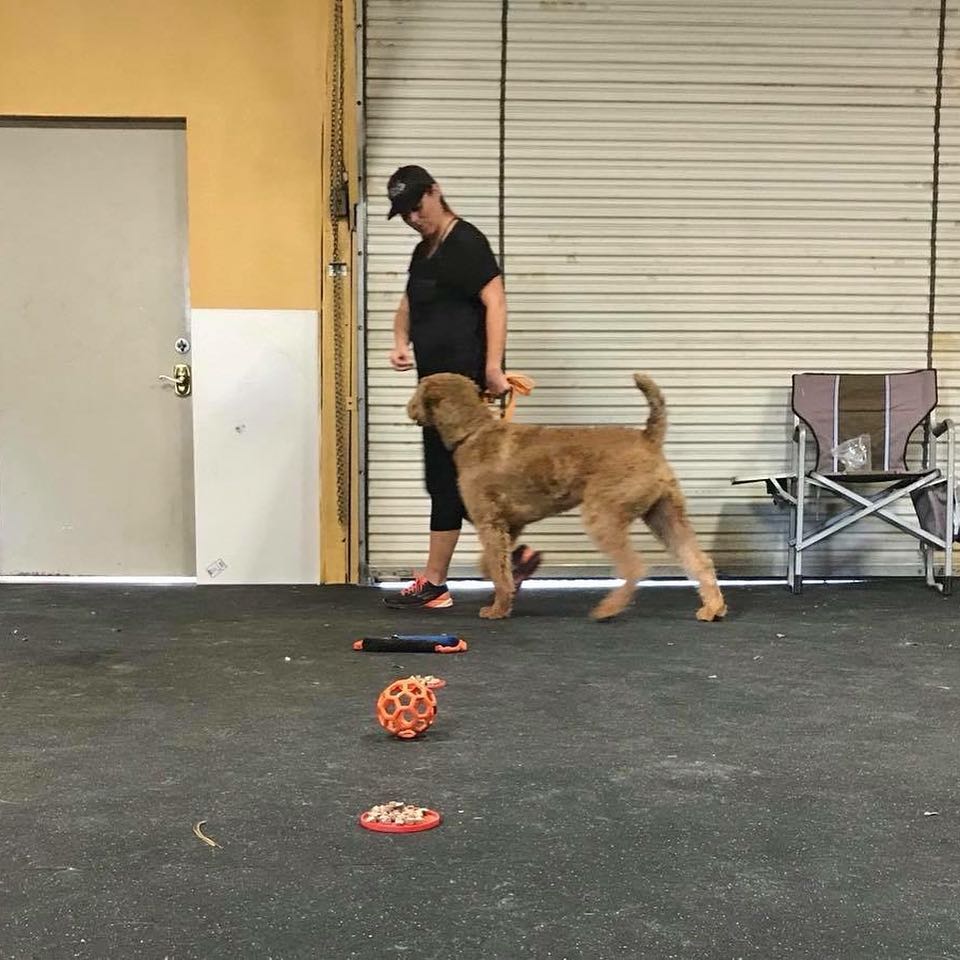Service Dog Training
Gold Country Pet Resort is pleased to offer training and certification of legitimate service dogs. We are staunch advocates for solid training and certification for legitimate service dogs.
Service Dogs
Pursuant to the American Disabilities Act, a service dog is defined as “a dog that has been individually trained to do work or perform tasks for an individual with a disability. The task(s) performed by the dog must be directly related to the person’s disability.” Given our professional background, we are all too aware of the problems created by everyone desiring their beloved pet to be a service dog. It doesn’t matter if your dog visits people who are disabled (that would be therapy dogs), the dog must be specifically “trained to perform a task.”
Who can qualify to have a service dog?
A disabled person. Period. You must have a legitimate disability. A legitimate disability may not be visible, such as PTSD, but you must have a disability as recognized by the ADA. We will ask you to provide to us, through a confidential process, medical verification of your disability, though we won’t do that at our first appointment. Having stress or anxiety is not typically enough to qualify you for a recognized disability. It is your doctor (not us) that can verify if your disability is recognized by the Americans With Disabilities Act. Without a disability there is no way to have a service dog.
Our commitment
Gold Country Pet Resort is committed to high quality training and certification of qualified service dogs. We have a rigorous application process. We require you to maintain training logs during your training time with us. We have spent nearly years building our program to withstand the scrutiny that is sure to come down on the service dog industry in today’s climate.
Trained to perform a task
To begin, we need a dog who is extensively trained in obedience in order to navigate the world with the person with the disability THEN they must be specifically trained to perform a task. That task should assist the disabled person in mitigating their disability while out in public. Examples of tasks are: providing balance and support for people with medical conditions affecting their balance, and alerting to sounds for hearing impaired people. The lists of tasks are endless but we choose not to list them here. It is important for us to assess with the disabled person what tasks will best help their individual situation. We will explore that together. It is important to note that simply “being more comfortable with the dog present” is not a task. We all love our dogs and I am definitely most comfortable when my dog is with me. But I am not disabled. And comfort is not a task as per the ADA. Therefore, a lot of training is required for legitimately trained service dogs.
Our trained dogs
We are currently creating a program for trained service dogs for sale. We will be offering the ability to watch your puppy prospect grow into a fully trained service dog available for sale beginning in 2023. Stay tuned for details. Meanwhile, if you are a veteran and are interested in a fully-trained service dog you may check out our non-profit, Infinite PawsAbilities at www.infinitepaws.org.
Train your own dog
We are often asked if we can assist people in training their own dog to be a service dog. The answer is: It depends. If your dog has the right qualities to become your service dog, then yes, we can work with you. If you want to train the dog yourself, we can offer you a comprehensive program to achieve your goals where we train you to train your dog.
We also can take the dog into our residential board and train program. This may be a faster avenue, though more expensive. However, we only take the dog for the board and train to get the needed obedience on him/her to begin with. We will also be continuing our evaluation of your dog as they progress. We will let you know at the earliest opportunity if we have concerns about your dogs ability to qualify.

The training process
We will focus on basic obedience first as that will shape everything we do. While we typically recommend our coaching programs over our board and train, we recognize that for some people the board and train programs are the right fit. We can discuss this during the assessment. Regardless of which path you go down, we must put on excellent obedience. We will focus on teaching the dog to learn and putting on all the obedience necessary. That way, if something happens on your path toward having a service dog, you will never regret putting on the obedience.
Only once we are putting on our final obedience touches, will we start addressing the task training. Just like with the obedience portion, task training can be done via our coaching programs where we teach you to train your own dog or by board and train programs. We will discuss that at our assessment and revisit it during our obedience path.
Certification
Once the dog is ready, it is time to think about certification. First off, let’s be honest, the ADA does NOT require certification. You are free at any time that you feel you are qualified to start using your dog as a service dog. So why certify? Because we want to ensure that we support all of our students that go the distance and show excellence in training. When you certify through our program, we will be able to vouch that you have achieved certain training standards. We will acknowledge that for flight plans (yes, we get calls from the airlines), and you have the comfort of knowing that you can refer any questions about your qualifications to us and access our library of support to help you navigate the world with your new service dog.
After certification
Nope, we’re not done, just because we certified. This is just the beginning. Because for the true service dog, it isn’t about being able to go out in public…it’s about being able and maintaining the ability to perform their trained tasks. We have no set requirements for training after certification, though we will make individual recommendations. However, the service dog must be re-certified at certain intervals so that we can ensure that the training is being maintained. We are fairly stringent on re-certification for the first three years, and then we lighten up some…not because we expect less, but because we know that by that time, you have truly habituated training into your lifestyle.
Therapy Dog Training
A therapy dog is a dog trained to provide affection and comfort to people in hospitals, retirement homes, nursing homes, schools, hospices, disaster areas, and to people with learning difficulties. Therapy dogs are NOT Service dogs. In order to be a recognized therapy dog, you must join any one of the organizations that offer certifications. We are happy to discuss the pros and cons of each organization with you. The individual organizations will determine the criteria that you
Therapy dogs come in all sizes and breeds. The most important characteristic of a therapy dog is its temperament. A good therapy dog must be friendly, patient, confident, gentle, and at ease in all situations. Therapy dogs must enjoy human contact and be content to be petted and handled, sometimes clumsily.
A therapy dog’s primary job is to allow unfamiliar people to make physical contact with it and to enjoy that contact. Children in particular enjoy hugging animals; adults usually enjoy simply petting the dog. The dog might need to be lifted onto, or climb onto an individual’s lap or bed and sit or lie comfortably there. Many dogs contribute to the visiting experience by performing small tricks for their audience or by playing carefully structured games. In hospice environments, therapy dogs can play a role in palliative care by reducing death anxiety.
The primary training for therapy dogs is exceptional obedience. We will recommend you focus on training obedience up to and through our CGC Advanced/Urban criteria. This will prepare you for the obedience that you will encounter in any of the organizations tests. As with all of our obedience programs, your program can be tailored to your specific needs.
Emotional Support Dog Training
Emotional support dogs are not entitled to public access, nor are they allowed to accompany you in the cabin of most airliners any longer. There are certain provisions for them so that your landlord, who may otherwise not permit dogs, must allow you to have an emotional support dog.
We will be happy to write a letter regarding training for anyone who has completed our Fabulous Fido or Dream Dog Obedience Programs.

Become a Dog Trainer!
Earn an income while indulging your passion for dogs! Cherie Flores has been mentoring aspiring trainers reach their dreams for many years. Learn at your own pace and join our exclusive community where we support eachother and always strive for excellence. All of our mentors have many years of experience in the field, and are willing to work with you to achieve your goals.
